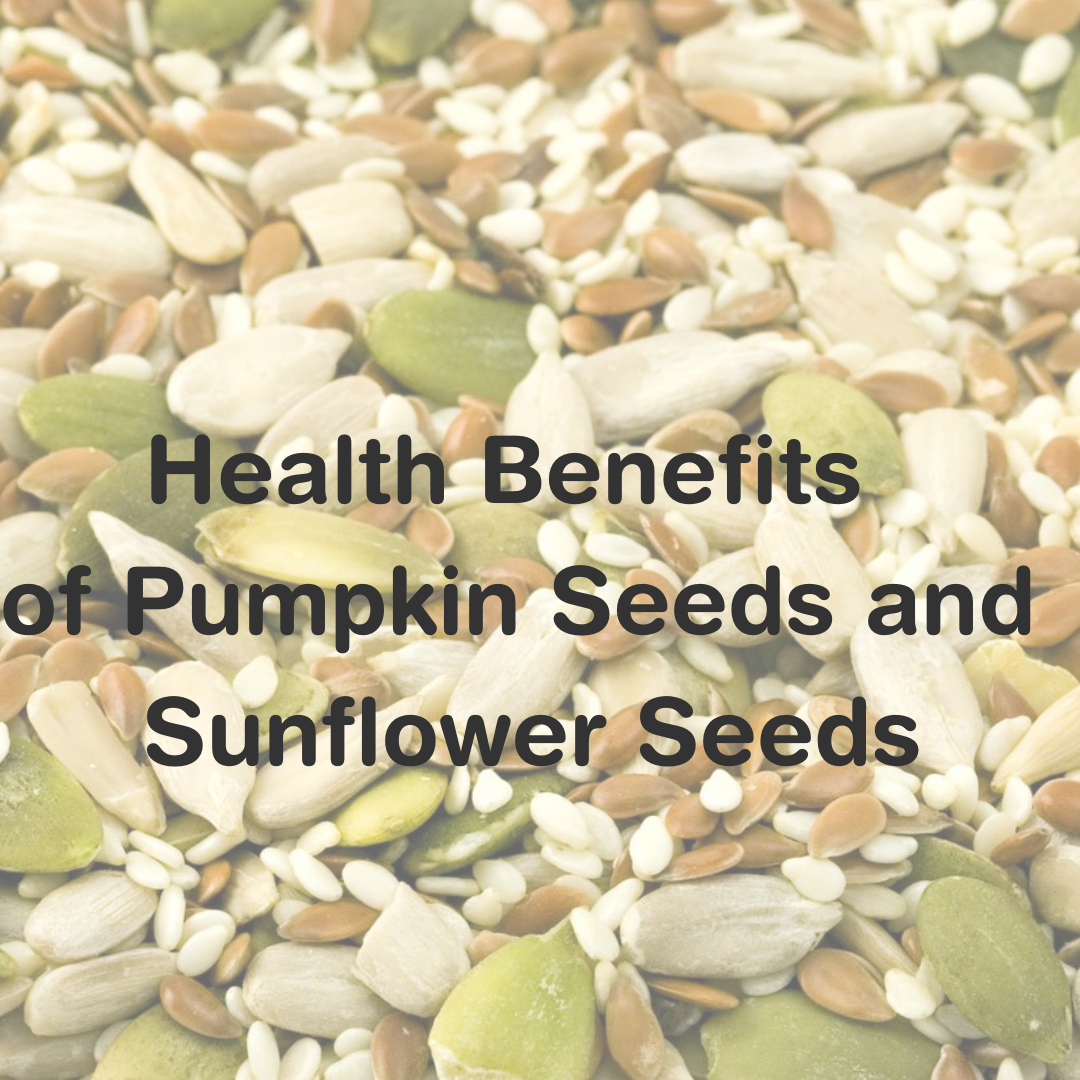Overview of Pumpkin and Sunflower seeds
Magnesium, zinc, iron, and protein are just a few of the nutrients that pumpkin seeds are high in. Magnesium can enhance nerve function and aid to control blood pressure. The immune system needs zinc, which also helps to lower inflammation. Protein is a vital component of bones, muscles, and other tissues, whereas iron is crucial for the synthesis of red blood cells. Moreover, pumpkin seeds include a large amount of fibre, which promotes satiety and improves digestion. They are also an excellent source of beneficial fats, such as oleic acid, which has been associated with lessened inflammatory response in the body. Vitamin E, a powerful antioxidant that shields your cells from oxidative damage brought on by free radicals, is abundant in sunflower seeds. In addition, sunflower seeds are a fantastic source of folate (also known as folic acid), which aids in the production of new cells in the body, particularly red blood cells, which are essential for preventing anaemia and preventing birth defects in pregnant children. Also, they are loaded with important minerals like copper, manganese, phosphorus, and magnesium, all of which contribute to our wellbeing. When consumed as part of a balanced diet, sunflower seeds’ high polyunsaturated fat content may help decrease cholesterol levels.
Nutrients: Sunflower and Pumpkin Seeds
With their rich array of vitamins and minerals, pumpkin seeds are a nutritional powerhouse. They are a great source of dietary fibre, which promotes weight management and aids in maintaining digestive health. Together with other trace elements like iron and potassium, pumpkin seeds also have significant concentrations of the minerals magnesium, zinc, and phosphorus. Moreover, they offer protein and important fatty acids like linoleic, oleic, and alpha-linoleic acid (ALA). These fatty acids can help lower inflammatory responses within the body and strengthen the cardiovascular system. Vitamin E, which is abundant in sunflower seeds and can help shield cells from free radical-induced oxidative damage. Many minerals, including thiamine, selenium, copper, phosphorus, and magnesium, are present in significant levels. In addition, sunflower seeds contain linoleic acid, an important fatty acid that supports normal cholesterol levels in the body. Moreover, they are a fantastic source of plant-based protein, delivering all nine essential amino acids—which our bodies cannot create on their own but require for optimal function—in a single serving of 5 grammes.
Benefits for Health: Pumpkin Seeds
With protein, healthy fats like omega-3 and omega-6 fatty acids, minerals like zinc and magnesium, and vitamins E and K, pumpkin seeds are a fantastic source of nourishment. The high zinc content of the seed is particularly advantageous for enhancing the immune system. Due to their high fibre content, pumpkin seeds may aid in the treatment of type 2 diabetes; consuming pumpkin seeds can lower blood sugar levels. Moreover, they contain anti-oxidants, which can guard against oxidative damage, a factor in ageing and disease. Moreover, studies have demonstrated that the oil from pumpkin seeds improves heart health by reducing cholesterol levels. Protein and other vital minerals including vitamin B6, magnesium, phosphorus, copper, manganese, and selenium may be found in abundance in sunflower seeds. Also, they offer a significant amount of dietary fibre, which supports healthy digestive health. Due to their high oleic acid content, sunflower seeds have strong anti-inflammatory qualities that may help reduce inflammation in the body related to illnesses such as arthritis and other conditions. They also include phytosterols, which have been associated to lowering bad cholesterol (LDL) levels while raising good cholesterol in the body (HDL).
Benefits for health: Sunflower Seeds
Sunflower seeds are a nutritional powerhouse that offer a wide range of health advantages to individuals who eat them. It has been discovered that sunflower seeds are high in vitamin E, which is necessary for a robust immune system and good skin. They also contain considerable amounts of magnesium, selenium, zinc, copper, phosphorus, copper, copper, and thiamine, all vital nutrients that are crucial to general health and wellbeing. The omega-3 fatty acids in sunflower seeds are even more advantageous because they have anti-inflammatory qualities and help lessen the risk of heart disease. Due to their phenolic contents, sunflower seeds also include antioxidant capabilities that help shield cells from free radical damage, which accelerates the ageing process or even promotes the growth of cancer. Last but not least, eating sunflower seeds has been linked to better digestion thanks to their high fibre content as well as lower cholesterol levels according to the unsaturated fats they contain. In conclusion, regularly eating sunflower seeds can provide a plethora of nutritional advantages that will help your long-term health and wellbeing!
Dish Ideas & Recipes for Pumpkin Seeds and Sunflower Seeds
Both pumpkin and sunflower seeds provide a number of vitamins, minerals, and antioxidants that can enhance general health, making them both well-known for their health advantages. They are a great source of fibre, protein, zinc, and vital fatty acids. Sunflower and pumpkin seeds are excellent options for anyone who want to increase the amount of nutrient-dense foods in their diet. There are countless alternatives for dishes and serving suggestions that incorporate pumpkin or sunflower seeds. They can be used to add taste and nutrition to smoothies or salads. To top oatmeal or yoghurt with a tasty, crunchy garnish, sprinkle them on top. Roasted pumpkin or sunflower seeds are delicious on their own or combined with other nuts and dried fruit for a more flavorful snack. For even more nutrient-dense on-the-go nutrition, incorporate them into trail mixes. Create some homemade seed butter with either kind of seed; it’s a wonderful substitution for nut butters purchased at the supermarket. Last but not least, add pumpkin or sunflower seeds to baking recipes for things like muffins, cookies, granola bars, and more!
Negative effects of Pumpkin Seeds and Sunflower Seeds
The health advantages of pumpkin and sunflower seeds can range widely, but like with any dietary supplement, it’s crucial to be aware of any possible negative effects. Digestive problems including gas, bloating, and diarrhoea can be among them. A buildup of fibre in the gut brought on by eating too many seeds at once may also result in cramping or discomfort. Similarly, introducing high-fiber foods like pumpkin and sunflower seeds could result in an upset stomach if you are not used to eating big levels of dietary fibre. When consuming pumpkin and sunflower seeds, one should also take into account their fat content. But, they also include omega 9s, which do not have the same advantages for heart health as the other two types of good fats. Both types of seeds are high in heart-healthy fats such omegas 3 and 6, as well as omegas 9. These fatty acids can potentially cause dangerous levels of fat deposition in the blood vessels over time if they are consumed in excess. Furthermore, because both kinds of seeds contain phytates, substances that are naturally present in plants, they may prevent your body from properly absorbing crucial elements like zinc from concurrently consumed foods or supplements.
Experts’ judgement About Pumpkin Seeds and Sunflower Seeds
Dr. Pankaj Kumar, the best nutritionist in Delhi, concurs that pumpkin and sunflower seeds have a number of health advantages. Zinc, magnesium, iron, and other vitamins found in pumpkin seeds can support a stronger immune system. Also, they contain a lot of antioxidants including vitamin E and lignans, which can guard against cancer. Vitamin B6, copper, phosphorus, magnesium, selenium, and fibre, all of which are necessary for a healthy digestive system and metabolism, can be found in sunflower seeds. He also noted the significant monounsaturated fat content of both varieties of seeds, which has been associated with lowered cholesterol levels. Another excellent source of plant-based proteins that can be utilised in place of animal-based proteins like beef or poultry are pumpkin and sunflower seeds. For vegetarians or vegans who might not have access to alternative protein sources, this makes them a perfect snack. Also, they offer vital fatty acids like Omega-3, which are important for lowering inflammation in the body and are particularly helpful for those with arthritis or joint pain because they reduce symptoms gradually and without the need for medication.
Conclusion
In conclusion, both sunflower seeds and pumpkin seeds are good for general health. They can be eaten raw, roasted, as a dish topping, or as a component of many cuisines. Both kinds of seeds have a variety of nutritional advantages, including the provision of important vitamins, minerals, and fatty acids. Further excellent sources of dietary fibre that aid in healthy digestion include pumpkin and sunflower seeds. They also include potent antioxidants that can help the body fight inflammation while warding off chronic illnesses like diabetes and heart disease. Finally, frequent consumption of these superfoods may assist to lower cholesterol levels while enhancing mental and cognitive function. An easy method to improve your physical and emotional wellbeing is to include pumpkin seeds and sunflower seeds in your diet.





GIPHY App Key not set. Please check settings